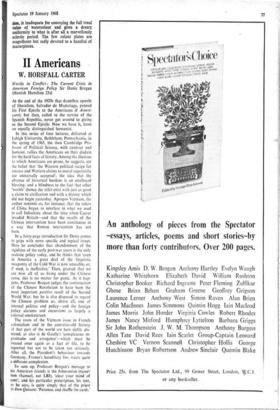Worlds in Conflict : The Current Crisis in American Foreign
Policy Sir Denis Brogan (Hamish Hamilton 25s)
II Americans
W. HORSFALL CARTER
At the end of the 1920s that dauntless apostle of liberalism, Salvador de Madariaga, penned
his First Epistle to the Americans (I Ameri- cans); but then, called to the service of the Spanish Republic, never got around to giving us the Second Epistle. Now we have it, from an equally distinguished humanist.
In this series of four lectures, delivered at Lehigh University, Bethlehem, Pennsylvania, in the spring of 1965, the then Cambridge Pro- fessor of Political Science, with candour and humour, rallies the Americans on their disdain for the hard facts of history. Among the illusions to which Americans are prone, he suggests, are the belief that `the Western political recipe for success and Western claims to moral superiority are universally accepted'; the idea that the absence of historical burdens is an unalloyed blessing; and a blindness to the fact that other 'worlds' (hence the title) exist with just as good a claim to civilisation and with a history which did not begin yesterday. Apropos Vietnam, the author reminds us, for instance, that the rulers of China began to interfere in what we used to call Indochina about the time when Caesar invaded Britain—and that the results of the Chinese intervention have been continuous in a way that Roman intervention has not been.
In a forty-page introduction Sir Denis comes to grips with more specific and topical issues.
Here he concludes that abandonment of the rigidities of the early post-war years is the only realistic policy today, and he thinks that 'even in America a great deal of the linguistic weaponry of the Cold War is now unusable, or, if used, is ineffective.' Then, granted that we
are now all of us living under the Chinese curse, this is no matter for panic. As it hap- pens, Professor Brogan judges the continuation of the Chinese Revolution to have been the most important positive result of the Second World War; but he is also disposed to regard the Chinese problem as, above all, one of internal politics and policy—and the foreign policy alarums and excursions as largely a colossal smokescreen.
The roots of the Vietnam issue in French colonialism and in the centuries-old history of that part of the world are here deftly dis- sected, as also is de Gaulle's `conspicuous in- gratitude. and arrogance'—which must be treated once again as a fact of life, to be regretted but not to be taken too seriously. After all, the President's behaviour towards Germany, France's hereditary foe, wears quite a different complexion.
To sum up, Professor Broean's message to his American friends is the Johnsonisn injunc'
Lion (Samuel, not LBJ), 'clear your mind of cant'; and his particular prescription, his text, as he says, is quite simply that of the priest in Don Quixote: 'Patience, and shuffle the cards.'


































 Previous page
Previous page